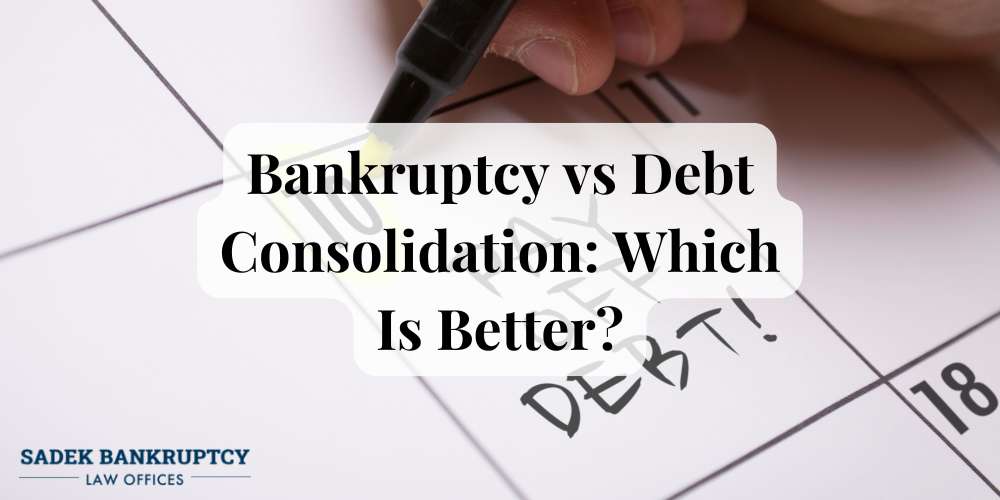When considering bankruptcy vs. debt consolidation, it’s important to evaluate which form of debt relief best suits your financial situation.
Bankruptcy provides a clean slate by discharging eligible debts but also offers legal protections that debt consolidation does not, protecting you from creditor’s actions during the bankruptcy process.
On the other hand, debt consolidation simplifies multiple debts into a single payment, potentially with a lower interest rate, without the lasting stigma of bankruptcy.
Consulting a Philadelphia bankruptcy attorney can help you understand these benefits and determine the best course of action. Call Sadek Bankruptcy Law Offices at 215-545-0009 or contact us online to schedule a consultation today.
What Is Bankruptcy?
Bankruptcy is a legal process designed to help individuals and businesses eliminate or repay their debts under the protection of the bankruptcy court. When you declare bankruptcy, you can discharge certain obligations and reorganize your financial situation, offering a fresh start.
The decision to declare bankruptcy often depends on how much debt you have and your overall financial situation. It’s important to note that bankruptcy can significantly impact your credit score, but it also provides legal protections, such as an automatic stay that halts most collection activities.
Chapter 7 Bankruptcy
Chapter 7 bankruptcy, often referred to as “liquidation bankruptcy,” helps individuals eliminate most of their unsecured debt.
When you declare Chapter 7 bankruptcy, a court-appointed trustee evaluates your assets and may sell non-exempt property to pay creditors. This process can discharge eligible debts, such as credit card balances and medical bills, but it does not typically eliminate child support debt or alimony obligations.
To qualify for Chapter 7 bankruptcy, you must pass a means test that evaluates your income and financial situation. If your income is below the median level for your state, you may be eligible.
One significant impact of Chapter 7 is on your credit score, which can be substantially lowered and stay on your credit report for up to a decade. However, it offers immediate relief through an automatic stay, halting most collection activities, including wage garnishments, foreclosures, and creditor harassment.
Chapter 7 bankruptcy is suitable for those with overwhelming unsecured debt and limited assets. It offers a way to reset your financial situation and work towards a more stable future.
Chapter 13 Bankruptcy
Chapter 13 bankruptcy, also known as a “wage earner’s plan,” allows individuals with regular income to create a repayment plan to pay off all or part of their debts over three to five years. Unlike Chapter 7, which involves liquidating assets, Chapter 13 lets you keep your property while catching up on missed payments and reorganizing your financial situation.
Under Chapter 13 bankruptcy, you propose a repayment plan to make debt payments to creditors over the specified period. The amount you pay is based on your income, expenses, and the types of debt you have. This type of bankruptcy can help manage secured debts like mortgage or car loans, which are prioritized in the repayment plan. It also provides protection against foreclosure, allowing you to save your home by curing delinquent mortgage payments.
Chapter 13 bankruptcy does not discharge certain debts, such as tax debt, child support, alimony, or federal student loans. However, it can help manage unsecured debts like credit card balances and medical bills, potentially reducing the total amount owed. Any remaining debt after completing the repayment plan may be discharged.
Filing for Chapter 13 bankruptcy considerably impacts your credit score and remains on your credit report for up to seven years. Despite that, it provides the benefit of an automatic stay, which stops collection activities, wage garnishments, and creditor harassment, giving you the breathing room to reorganize your finances and work towards financial stability.
What Is Debt Consolidation?
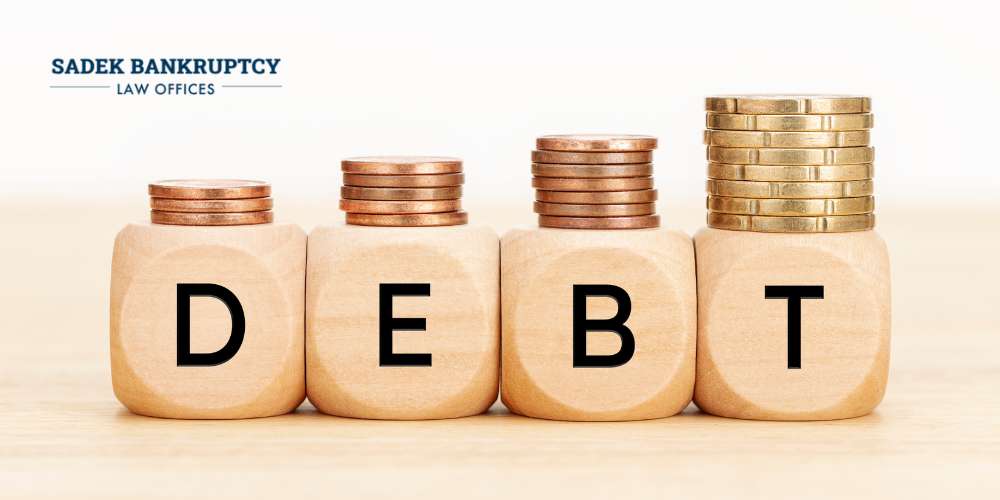
A debt consolidation loan is a financial tool typically offered by a bank or credit union that can streamline your finances by combining multiple debts into one loan with a single monthly payment.
Debt consolidation loans can initially lower credit scores, but consistent monthly payments will reflect positively on your credit history and raise your score over time.
Before deciding on a debt consolidation loan, it’s wise to consult with a credit counseling agency to ensure it aligns with your financial goals and circumstances.
Personal Loans
Consolidating debt through a personal loan involves taking out a new loan to pay off multiple debts, resulting in one monthly payment instead of several. This method can help consolidate debt and potentially save money on interest costs, especially if the personal loan has a lower interest rate than your existing debts.
Factors to consider include whether the loan is secured or unsecured, as secured personal loans might require collateral. Additionally, it’s essential to compare interest rates, fees, and the total cost of the loan to ensure it effectively reduces your overall financial burden.
By simplifying multiple monthly payments into one, a personal loan can make debt management more straightforward and financially beneficial.
Balance Transfer Cards
Balance transfer credit cards allow you to move existing credit card debt to a new card with a lower or 0% introductory interest rate for a specified period. This strategy can help you save money on interest rates and pay off your credit card balances more efficiently.
When using a balance transfer credit card, it’s important to consider the length of the introductory period, any balance transfer fees, and the interest rate that applies after the promotional period ends.
Making at least the minimum monthly payment is essential to avoid penalties and maximize the benefits of the lower interest rate. It is also important to have a plan to pay off the remaining balance before the introductory period ends to prevent higher interest costs from accruing.
Home Equity Lines of Credit (HELOCs)
A home equity line of credit (HELOC) is a type of revolving credit secured by the equity in your home, offering flexibility to borrow funds as needed. HELOCs are secured loans that typically have variable interest rates and can be used for consolidating debt.
It’s important to note that a home equity line of credit is different from a home equity loan. Home equity loans provide a lump sum of money, while HELOCs allow you to access funds up to a certain limit during a draw period, followed by a repayment period.
Key considerations include the interest rate, potential fees, and the impact on your home’s equity. Since your home serves as collateral, it’s essential to manage the monthly payments carefully to avoid risking foreclosure.
Does Debt Consolidation Affect Credit Scores?
Applying for a debt consolidation loan, balance transfer credit card, or home equity loan usually results in a hard inquiry on credit reports, which can temporarily lower your credit score.
However, consolidating multiple debts into one monthly payment can simplify your financial management and help you stay current with payments. Consistent, on-time monthly payments are essential to improving your credit score over time.
Reducing the number of outstanding debts and lowering your overall credit utilization ratio can also boost your credit score, but it’s important to avoid accumulating new debt while paying off the consolidated loan to improve your credit standing.
Consulting with a debt counseling service can provide further guidance on managing debt consolidation and its impact on your credit report.
Is Debt Consolidation the Same as Bankruptcy?
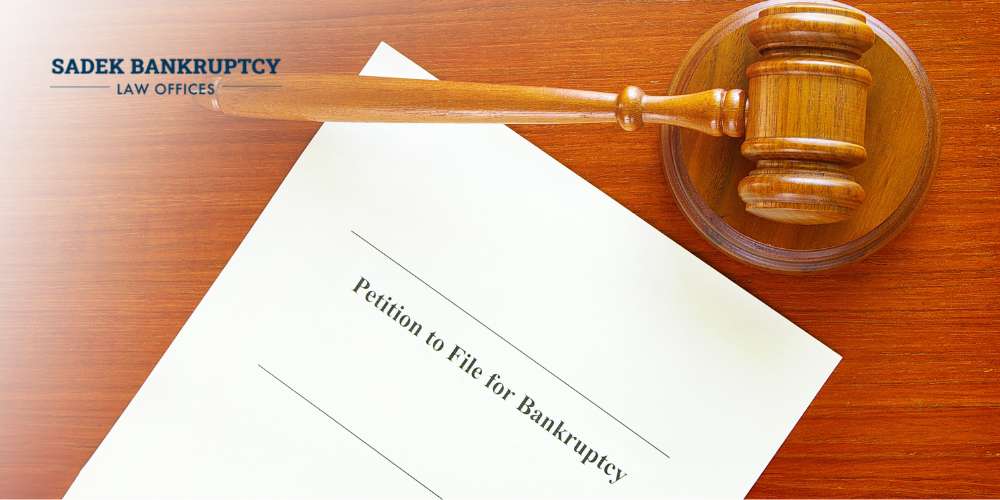
Debt consolidation and bankruptcy are not the same and serve different purposes in managing financial challenges.
A debt consolidation agreement combines multiple debts into a single loan with one monthly payment to simplify debt management and potentially save on interest costs. This process does not eliminate the debt but simply restructures it to be more manageable. These loans typically do not have a prolonged impact on credit reports.
Bankruptcy, on the other hand, is a legal process that can discharge or reorganize debts under the protection of a bankruptcy court. A bankruptcy filing may involve Chapter 7, which liquidates assets to pay off debts, or Chapter 13, which sets up a repayment plan. Bankruptcy provides legal protections and can eliminate eligible debts but significantly impacts your credit score and remains on your credit reports for up to ten years.
The debate of debt consolidation vs. bankruptcy can cause confusion when it comes to making decisions about your financial future. It is important that you weigh the pros and cons of each and make a choice based on what benefits your financial situation the most.
Is Bankruptcy or Consolidation Better for You?
Deciding whether bankruptcy or debt consolidation is better for you depends on your financial situation and long-term goals.
If you have a steady income and your primary challenge is managing multiple debts with high interest rates, a debt consolidation agreement might be the better option. This debt management plan simplifies your finances by consolidating debt into one monthly payment, potentially lowering your interest rate and making your debt more manageable.
However, if your debt is overwhelming, you are unable to keep up with payments, and you face creditor harassment or legal actions, bankruptcy may offer more substantial relief. Bankruptcy filing can discharge eligible debts or create a manageable repayment plan under court protection, providing a fresh start. Keep in mind that bankruptcy significantly impacts your credit score and remains on your credit reports for up to ten years, while debt consolidation can have a less severe impact on your credit.
Consulting with a credit counselor or a bankruptcy attorney can help you evaluate your options. These professionals can offer personal finance advice, credit counseling, and the best approach to take based on your income, debt levels, ability to pay interest, and future financial goals.
By understanding the differences between debt consolidation and bankruptcy, you can make an informed decision tailored to your specific circumstances.
Debt Consolidation vs Chapter 7
Here are a few key differences between debt consolidation and Chapter 7 bankruptcy:
Impact on Credit Score:
- Debt Consolidation: May initially lower your credit score due to a hard inquiry but can improve your score over time with consistent payments.
- Chapter 7 Bankruptcy: Significantly lowers your credit score and remains on your credit report for up to ten years.
Debt Resolution:
- Debt Consolidation: Combines multiple debts into one loan with a single monthly payment, often at a lower interest rate, but does not eliminate the debt.
- Chapter 7 Bankruptcy: Discharges and eliminates eligible debts, but may require liquidating non-exempt assets.
Eligibility Requirements:
- Debt Consolidation: Generally requires a steady income and a credit profile that qualifies for a new loan or credit line.
- Chapter 7 Bankruptcy: Requires passing a means test to determine eligibility based on income and financial situation.
Legal Protections:
- Debt Consolidation: Does not provide legal protection from creditors beyond restructuring the debt into a single loan.
- Chapter 7 Bankruptcy: Offers legal protections such as an automatic stay, which halts most collection activities and creditor harassment during the bankruptcy process.
Debt Consolidation vs Chapter 13
These are the key differences between debt consolidation and Chapter 13 bankruptcy:
The Process:
- Debt Consolidation: Involves taking out a new loan to pay off multiple existing debts, resulting in one monthly payment.
- Chapter 13 Bankruptcy: Requires creating a court-approved repayment plan to pay back debts over three to five years while keeping your assets.
Impact on Credit Score:
- Debt Consolidation: May cause a temporary dip in your credit score due to a hard inquiry.
- Chapter 13 Bankruptcy: Significantly impacts your credit score and remains on your credit report for up to seven years.
Debt Relief:
- Debt Consolidation: Combines debts into one payment but does not reduce the overall amount owed; interest rates may be lower.
- Chapter 13 Bankruptcy: Allows you to repay a portion of your debts through a structured plan and discharges remaining eligible debts after the repayment period.
Legal Protection:
- Debt Consolidation: Does not provide legal protection from creditors.
- Chapter 13 Bankruptcy: Provides legal protection through an automatic stay, halting creditor actions like wage garnishments and foreclosures.
Eligibility:
- Debt Consolidation: Requires good credit to obtain a loan with favorable terms.
- Chapter 13 Bankruptcy: Requires a regular income to qualify for the repayment plan.
Should I File Bankruptcy or Debt Consolidation?

Deciding whether to file for bankruptcy or pursue debt consolidation depends on your financial circumstances.
If you have a large amount of debt and insufficient income to make monthly payments, bankruptcy might be the better option, as it can discharge debts or create a manageable repayment plan.
Alternatively, if your debt is more manageable and you have a steady income, a debt consolidation loan could simplify your payments and potentially lower your interest rates. Debt consolidation can work if you make consistent payments and manage your finances wisely.
Additionally, debt settlement, where a debt settlement company negotiates with creditors to accept a lump sum payment less than the total amount owed, is another option. However, debt settlement can significantly impact your credit score and may have tax implications.
Consulting with a credit counselor or bankruptcy attorney can help you determine the best course of action for your situation.
Advantages of Bankruptcy
- Debt Discharge: Chapter 7 bankruptcy can eliminate most unsecured debts, giving you a fresh financial start.
- Automatic Stay: Filing for bankruptcy triggers an automatic stay, which halts most collection actions, including lawsuits, wage garnishments, and creditor harassment.
- Asset Protection: Chapter 13 bankruptcy allows you to keep your property while reorganizing your debt through a repayment plan.
- Debt Repayment Plan: Chapter 13 provides a structured repayment plan that makes debt management more predictable and manageable.
- Financial Relief: Bankruptcy can reduce financial stress by providing a clear path to resolving overwhelming debt.
Disadvantages of Bankruptcy
- Credit Impact: Bankruptcy significantly damages your credit score and can remain on your credit report for up to a decade for Chapter 7 and up to seven years for Chapter 13.
- Asset Liquidation: In Chapter 7 bankruptcy, non-exempt assets may be sold to pay off creditors, which can include valuable property.
- Cost: Bankruptcy involves filing fees, attorney fees, and court costs, which can add up, although these costs are often outweighed by the debt relief provided.
- Limited Eligibility: Not all debts can be discharged in bankruptcy, such as student loans, child support, alimony, and certain tax debts. Additionally, there are eligibility requirements for filing, particularly for Chapter 7.
- Public Record: Bankruptcy filings are a matter of public record, meaning your financial situation is accessible to anyone who searches for it.
Advantages of Debt Consolidation Loans
- Simplified Payments: Combines multiple debts into a single monthly payment, making it easier to manage.
- Lower Interest Rates: Often comes with a lower interest rate compared to credit card debt, potentially saving you money over time.
- Fixed Repayment Schedule: Provides a clear repayment plan with a set end date, helping you stay on track and pay off your debt sooner.
- Improved Credit Score: Making consistent, on-time payments on a consolidation loan can positively impact your credit score over time.
- Reduced Stress: Simplifying your financial obligations into one payment can reduce the stress and anxiety associated with managing multiple debts.
Disadvantages of Debt Consolidation Loans
- Initial Impact on Credit Score: Applying for a debt consolidation loan results in a hard inquiry on your credit report, which can temporarily lower your credit score.
- Potential Fees: Some consolidation loans come with origination fees, balance transfer fees, or prepayment penalties.
- Collateral Requirement: Secured consolidation loans require collateral, such as your home or car, putting these assets at risk if you default on the loan.
- Not a Cure-All: Debt consolidation does not address the underlying spending habits that led to debt accumulation. Without discipline, consolidating debt may free up credit lines that you might be tempted to use, leading to further debt.
- Extended Repayment Period: While monthly payments may be lower, extending the repayment period can result in paying more interest over the life of the loan.
How Do Debt Consolidation and Bankruptcy Affect Credit?
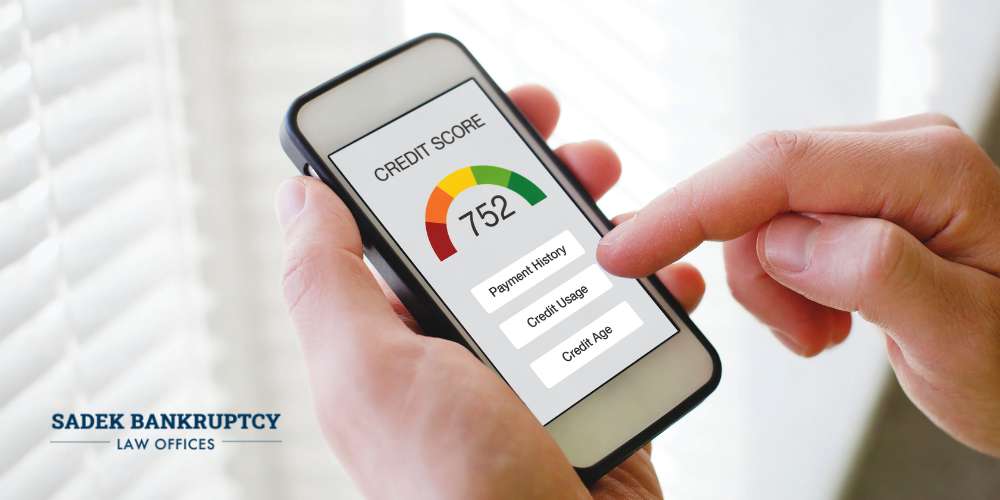
Debt consolidation and bankruptcy each impact your credit in distinct ways. Debt consolidation may initially lower your credit score due to a hard inquiry but can improve it over time through regular, on-time payments and decreased credit utilization.
In contrast, bankruptcy has a long-lasting negative impact on your credit score, with a Chapter 7 bankruptcy remaining on your credit report for up to 10 years and a Chapter 13 for up to 7 years. Despite the initial damage, bankruptcy can provide a fresh start, allowing for gradual credit rebuilding if managed responsibly.
How Long Does a Debt Consolidation Loan Stay on Your Credit Report?
A debt consolidation loan itself does not have a specific time frame for how long it stays on your credit report; rather, it is treated like any other loan.
Once the loan is paid off and closed, it will stay on your credit report for up to 10 years as a positive credit history if there were no late payments or defaults. This can help improve your credit score over time by showing a history of responsible credit management.
If there were late payments or defaults, those negative marks could remain on your credit report for up to seven years.
How Long Does Bankruptcy Stay on Your Credit Report?
Bankruptcy remains on your credit report for a significant period, depending on the type filed.
Chapter 7 bankruptcy, which involves liquidating assets to pay off debts, stays on your credit report for up to 10 years from the filing date. Chapter 13 bankruptcy, which involves a repayment plan for some or all of your debts, stays on your credit report for up to 7 years from the filing date.
During this time, bankruptcy can significantly impact your credit score, but its influence will gradually lessen as you demonstrate responsible financial behavior.
Contact the Philadelphia Bankruptcy Lawyers at Sadek Bankruptcy Law Offices
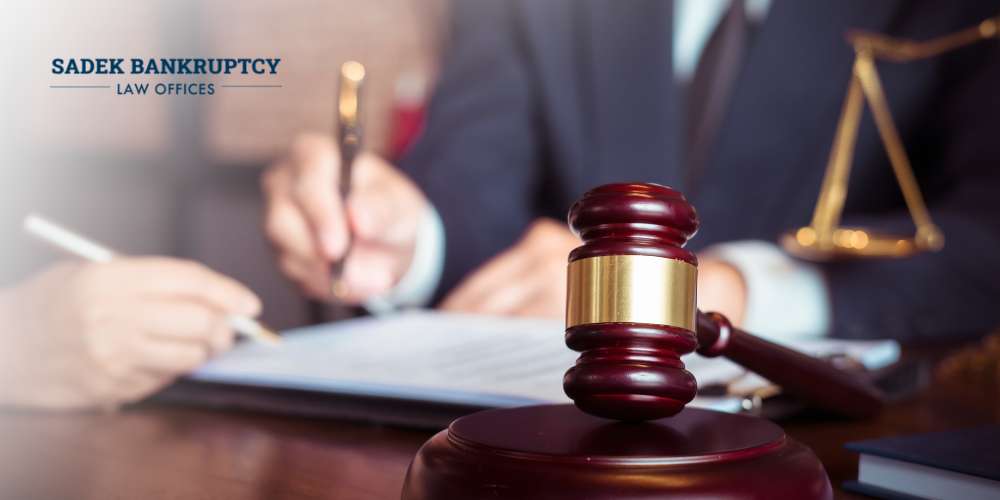
If you’re struggling with overwhelming debt and seeking a way to regain financial stability, the experienced Philadelphia bankruptcy lawyers at Sadek Bankruptcy Law Offices can help.
Our dedicated bankruptcy attorneys provide comprehensive debt management solutions tailored to your unique situation. We understand the burden of attorney fees and work to offer affordable, transparent pricing.
Call 215-545-0009 or contact us online to schedule a consultation with a skilled debt consolidation attorney and take the first step toward financial freedom.





